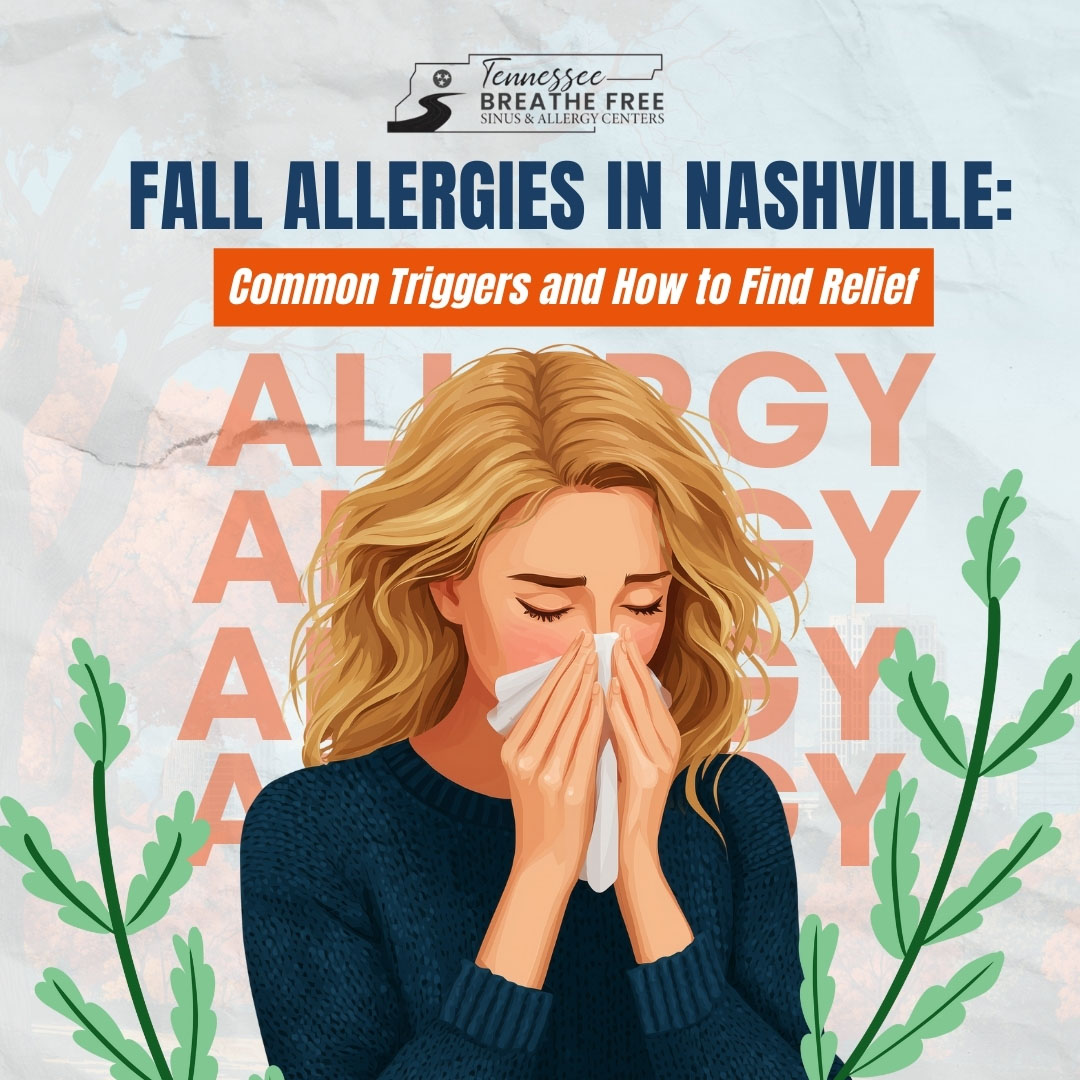Fall Allergies in Nashville
Common Triggers and How to Find Relief

Cooler mornings, football season, and changing leaves make fall one of the most enjoyable times of the year in Middle Tennessee. But for many families, autumn also means the return of sneezing, congestion, itchy eyes, and sinus headaches. Nashville allergies are especially common in the fall, and they can affect kids and adults alike.
At Tennessee Breathe Free, we see many individuals who experience worsening symptoms in the fall. If this sounds familiar, a medical evaluation can help determine your specific triggers. Let’s take a closer look at what’s causing these seasonal problems — and how you can explore effective strategies to manage symptoms.
Ragweed: The Main Culprit
Ragweed is one of the biggest triggers for fall allergies in Nashville, TN. This plant releases huge amounts of pollen starting in late August and often lasts until the first frost in November. Just one ragweed plant can produce millions of pollen grains, and those grains can travel for miles on the wind.
Even if you don’t see ragweed growing near your home, pollen is likely in the air every time you step outside. Common symptoms include:
- Runny or stuffy nose
- Sneezing
- Itchy or watery eyes
- Postnasal drip
Mold Growth in Humid Weather
Fall in Nashville often comes with warm days and damp conditions. Fallen leaves that stay wet can become a breeding ground for mold. Mold spores spread easily through the air and can irritate your nose and lungs when you breathe them in.
If you’re sensitive to mold, you may notice that your symptoms get worse after raking leaves, spending time in basements, or when the weather is especially rainy. Mold allergies often mimic sinus infections, causing pressure around your face and head.
Dust in Schools and Homes
As kids return to school and families start running their heating systems again, dust becomes another major trigger. Dust mites thrive indoors, especially in bedding, carpets, and upholstered furniture.
Schools are common sources of dust exposure, with old carpets and crowded classrooms making symptoms worse. At home, heating systems can stir up dust after months of sitting unused, spreading allergens throughout the house.
Symptoms caused by dust often include sneezing, congestion, and morning headaches. For children, dust allergies may also show up as frequent coughing or trouble sleeping.
Nashville’s Climate and Sinus Problems
Nashville’s fall climate is tricky for allergy sufferers. The mix of warm, humid days followed by sudden cold fronts makes it easier for allergens like mold and ragweed to thrive. This constant shift in weather can also inflame your sinuses, leading to headaches and chronic congestion.
When you combine seasonal pollen, indoor dust, and mold spores, it’s no surprise that fall allergies can aggravate sinus symptoms for many in the Nashville area. Our team evaluates each case individually to help patients find appropriate care solutions.
Finding Real Relief
Managing allergies isn’t just about taking an over-the-counter pill and hoping for the best. To really control symptoms, it helps to take a multi-step approach:
- Limit exposure when possible.
- Keep windows closed on high pollen days.
- Use a HEPA filter in your bedroom.
- Wash bedding in hot water weekly to cut down on dust mites.
- Rinse your sinuses. A saline spray or rinse can wash away allergens and reduce swelling in your nasal passages.
- Stay on top of mold and dust. Clean damp areas in your home regularly, vacuum carpets with a HEPA vacuum, and change HVAC filters often.
- See an ENT for lasting solutions. If your symptoms don’t improve, it may be time to get checked. At Tennessee Breathe Free, we offer allergy testing that can help identify potential triggers, along with sinus treatment options tailored to your medical history and specific needs
Don’t Let Allergies Ruin Your Fall
Fall in Middle Tennessee should be a time to enjoy football games, festivals, and crisp outdoor evenings — not a season spent fighting constant congestion. Whether you’re battling ragweed pollen, mold spores, or indoor dust, there are clinically recommended strategies that may help reduce symptoms for many patients.
If you’re tired of dealing with ongoing symptoms from Nashville allergies, call Tennessee Breathe Free today. We’ll work with you to identify the cause of your fall allergies and create a treatment plan that helps you breathe easier. Relief doesn’t have to wait — your path to lasting comfort starts here.


